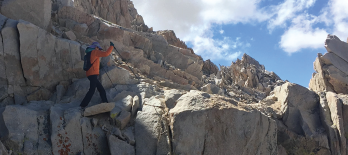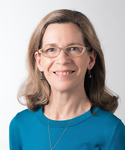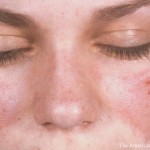Reintroduction to Genetics

Dr. Criswell hikes a narrow rocky ledge close to the top of Mt. Whitney.
Next was a rheumatology fellowship at UCSF, combined with pursuing a master’s degree in public health at the UC Berkeley School of Public Health. There she encountered Mary-Claire King, PhD, renowned for her research in breast cancer genetics, and who was then involved in a lupus project.
Dr. King, currently professor of genomic sciences and of medicine at the University of Washington, Seattle, introduced Dr. Criswell to the new field of genetic epidemiology. By the time she finished her fellowship training in 1992, Dr. Criswell had determined that she would be a rheumatologist pursuing genetic epidemiology research.
Her fellowship mentor, the late Wallace V. Epstein, MD, a forward-thinking advocate for women and students of color, provided a “great training environment” and was supportive of her desire to pursue genetic epidemiology. UCSF, as an institution, had become keenly interested in human genetics, so Dr. Criswell took a faculty appointment there, and began to seek research funding for her work.
Opportunities Abroad
On two different occasions, Dr. Criswell took her family to Europe while she pursued additional training. At the Netherlands Institute for Health Sciences in Rotterdam, she obtained a DSc. Her twin daughters, age three, took to the language, which sparked Dr. Criswell’s plan to enroll them in a French immersion school once back in the States.
Her second international experience was with Prof. Xavier Mariette, MD, PhD, a world-renowned expert in Sjögren’s syndrome and head of rheumatology at Bicêtre Hospital, Paris-Sud University. That partnership was timely; Dr. Criswell was co-leading the Sjögren’s International Collaborative Clinical Alliance (SICCA) registry project, which had started in 2003, and Dr. Mariette’s group was interested in more involvement with genetics. While Dr. Criswell was in France, recruitment had begun for chief of the Division of Rheumatology at UCSF. She was selected for the position while abroad and started in the role upon her return, and served in that role until March 2020. Dr. Criswell became vice chancellor of research at UCSF in November 2017.
Teamwork Prominent
Throughout her years at UCSF, Dr. Criswell has built a research program focusing on the genetics and epidemiology of autoimmune disease, particularly RA and SLE. Collectively, these efforts, including performance of genome-wide association studies, have contributed to the identification of ~100 genes that influence risk and outcomes in RA and SLE. Several recent studies have investigated ethnic differences as they relate to autoimmune disease risk and outcomes. Other recent studies seek to define the contribution of epigenetic factors, such as DNA methylation patterns to disease risk and outcome.
“These investigations are by nature very collaborative,” Dr. Criswell points out, and require many researchers, as well as coordinated funding efforts. For example, developing research proposals and conducting research requires identifying leads for teams—one for the laboratory work and someone else to take the lead on recruiting the patients. Still another team must take the lead on analyzing the data.
“These groups have to work very closely together to coordinate the work. And so a prominent theme throughout my career in medicine and as a researcher has been teamwork,” she says. “I’ve never felt like I had to do this all on my own, or that I was competing directly against someone else. I’ve always been interested in exploring the challenging problems in our field that we should tackle and finding the people that we need to collaborate with to get this done.”


